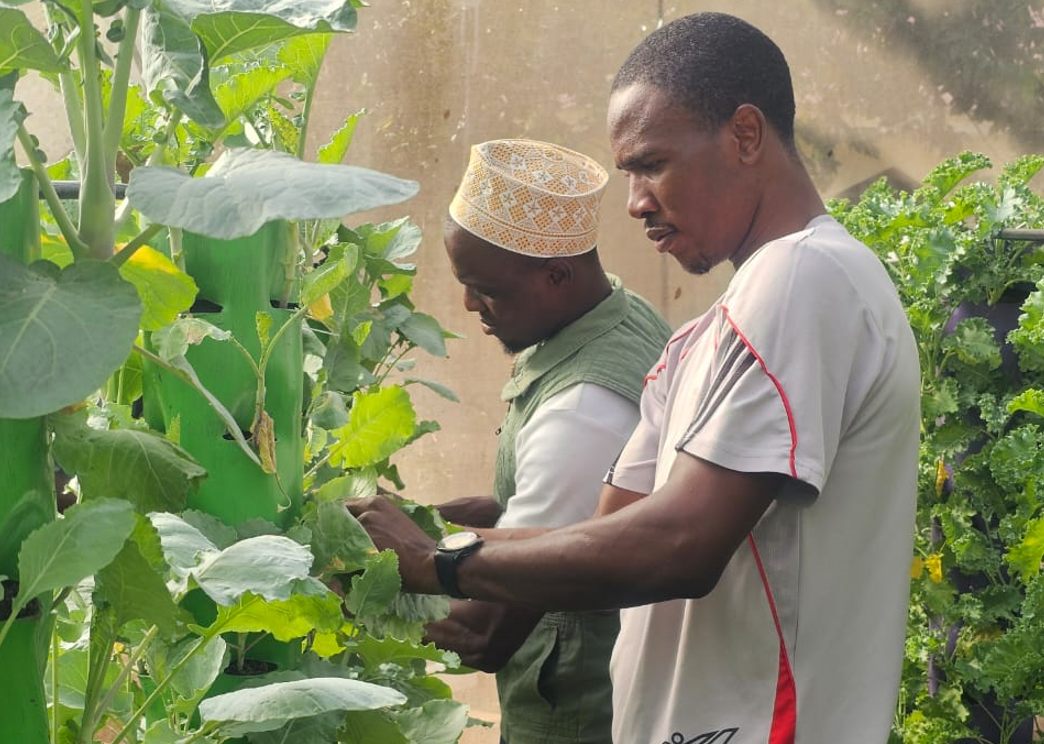
Rescued children engage in hydroponic farming on Kenya’s coast
Al-Walidayn Girls and Boys Rescue Center, nestled in the serene environment of Kwale County along the Kenyan coast, is one of the largest and most vital sanctuaries for vulnerable children. Home to approximately 200 children, the center provides a haven for those who have faced some of life’s most difficult challenges.
Many of the children were orphaned at a young age, while others were rescued from the streets where they struggled to survive. A significant number are victims of child trafficking, given Kwale’s proximity to the Kenya-Tanzania border, a notorious corridor for traffickers.

Founded to provide shelter, care, and a future for these children, Al-Walidayn is more than just a rescue center. It is a nurturing space where children can rebuild their lives. The center focuses on equipping the children with the tools they need to thrive in the outside world. While formal education is a key component, the center also emphasizes vocational training, ensuring the children acquire practical skills such as culinary arts, tailoring, hairdressing, and farming.
The rescue center depends heavily on the goodwill of local and international well-wishers who offer support in various forms, including financial donations and essential supplies. However, as part of a broader strategy to empower the children and create a more self-sustaining environment, Al-Walidayn has recently introduced hydroponic farming, an innovative farming technique that allows plants to grow without soil. This groundbreaking initiative not only enhances food security for the center but also provides the children with hands-on training in a modern agricultural practice that is becoming increasingly popular across the globe.
Hydroponic farming helping children to be innovative
Hydroponic farming entails planting and cultivating crops in a controlled environment using a water-based solution rich in nutrients, rather than traditional soil. This method has been highly effective in regions with limited agricultural space or barren land, like the coastal area where Al-Walidayn is situated. With a relatively small space, the children can grow a variety of crops such as spinach, lettuce, kale, and tomatoes.

For the children, hydroponic farming is more than just an agricultural activity, it is a learning experience. Every day, they work under the guidance of local experts and staff members to plant, monitor, and harvest the crops.
“I came to this center two years ago after losing my parents at a young age. The center has not only provided me with an education but also equipped me with practical skills. Today, I can confidently say that I have learned a great deal, including farming,” says Mary (not her real name).
They learn about nutrient balance, water cycles, and the importance of sustainable farming methods. Through this, they develop a sense of responsibility and discipline as they care for the crops from the initial stages of germination to the final harvest.
A Source of income and self-sufficiency
The vegetables produced through hydroponic farming supplement the center’s food supply, providing fresh, nutritious meals for the children. Surplus crops are sold to local markets, providing an additional income stream for the center. This income helps cover some of the center’s operational costs and provides resources for other essential needs, such as clothing, school supplies, and medical care.

“Although we have a hospital and a school here, and everything is provided to us for free, it is quite satisfying to be engaged in economic activities and generate something from that,” says John (not his real name).
The hydroponic farming initiative also helps the children interact with the local community. The market sales give them a sense of pride and ownership as they see the fruits of their labor valued and appreciated by others. This interaction not only boosts their self-esteem but also teaches them about entrepreneurship and the importance of community engagement.
Building skills for the future
Beyond the immediate benefits of food production and income generation, the children at Al-Walidayn are gaining valuable life skills that will serve them well in the future. Hydroponic farming is an increasingly relevant and in-demand skill as countries across the world look for more sustainable ways to feed their populations in the face of urbanization and climate change. By learning and practicing this technique, the children say they’re positioning themselves to be leaders in modern agriculture.
“I came here from the streets of Kwale town feeling hopeless and unsure of my future. However, being here and taking the time to learn skills like farming has given me hope. In the future, I might work on a farm or even become a farmer myself,” says Bill (not his real name).
Additionally, the center integrates these activities with lessons on teamwork, patience, and problem-solving, all of which are crucial for their overall personal development. Whether or not they pursue farming as a career, these young individuals are gaining essential skills to help them navigate life’s challenges with resilience and creativity.
Empowering vulnerable children
“The introduction of hydroponic farming is just one of the many ways the center is empowering its children to take control of their future, ” said the center’s CEO, Fatma Bakthir.
She added that, from learning to grow their own food to acquiring vocational skills that could lead to employment or entrepreneurship opportunities, the center is “equipping these young people with tools for independence and self-sufficiency.”
The rescued children, who once faced uncertain futures, are now taking steps towards stability and empowerment. Al-Walidayn’s holistic approach to their care—combining education, vocational training, and now, innovative farming—ensures that these young minds are nurtured, allowing them to rebuild their lives and become productive members of society.






